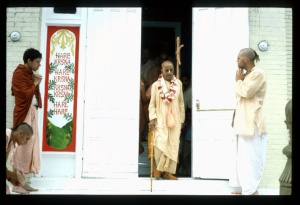CC Antya 8.79 (1975)

A.C. Bhaktivedanta Swami Prabhupada
TEXT 79
- tāra madhye pūrva-vidhi 'praśaṁsā' chāḍiyā
- para-vidhi 'nindā' kare 'baliṣṭha' jāniyā
SYNONYMS
tāra madhye—between the two; pūrva-vidhi—the former rule; praśaṁsā—praising; chāḍiyā—giving up; para-vidhi—the other rule; nindā—criticizing; kare—does; baliṣṭha jāniyā—knowing it to be more prominent.
TRANSLATION
"Of the two rules, Rāmacandra Purī obeys the first by abandoning praise, but although he knows that the second is more prominent, he neglects it by criticizing others.
PURPORT
The above-mentioned verse from Śrīmad-Bhāgavatam gives two injunctions. The first, called pūrva-vidhi, is that one should not praise, and the second, para-vidhi, is that one should not criticize. As will be apparent from the following verse, the injunction against praise is less important than the injunction against blasphemy. One should carefully observe the para-vidhi, although one may neglect the pūrva-vidhi. Thus the actual injunction is that one may praise but should not criticize. This is called śleṣokti, or a statement having two meanings. Rāmacandra Purī, however, acted in just the opposite way, for he neglected the para-vidhi but strictly observed the pūrva-vidhi. Since he avoided following the principle of not criticizing, Rāmacandra Purī broke both the rules.